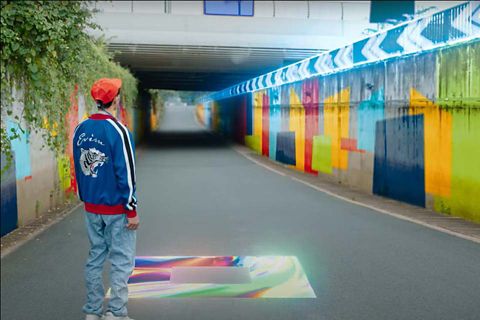- Study load
- Full time
- Program code
BP214
- Duration
- 3 years
- Application deadlines
-
06 Feb 2026
09 Oct 2026
- Intakes
- Feb or Mar, Oct
- Location
- RMIT Saigon South
- Program code
- N/A
- Application deadlines
- N/A
BP214
06 Feb 2026
09 Oct 2026
Do you love the idea of creating immersive and interactive games, either physical or digital? Then the Bachelor of Design (Games) is for you.
Through this program, you will gain a deep and critical understanding of games in multiple formats, and develop a wide range of design and technical skills to foster your creativity and working knowledge. The program will provide you with in-depth experience in the design and production of games, including level design, game balancing and game narratives, as well as knowledge of game art and programming. Additionally, students will learn theoretical and conceptual knowledge on game design, including critical thinking, analysis, and reflection.
The Bachelor of Design (Games) program is highly project-focused, and you will have the chance to make meaningful connections with creative leaders in Vietnam’s game space, as well as have access to internship opportunities at prominent studios offering real-world learning experiences.
Guided by academic staff and industry experts, and utilising state-of-the-art facilities and industry-standard software, you will engage in several studio projects, including a Capstone Project, to create and build functional games in an authentic team environment.
This program will provide you with everything you need to meet the strong global demand for game design professionals, including a powerful portfolio to present to potential employers.

The structure displayed shows the advised program structure and progression.
(***): Capstone Project
*University elective: Students can choose from elective courses offered across the university in any program.
**Design Studio: Create your own projects in a collaborative environment. You will make your own games, from board games to video games, inclusive of prototyping and playtesting. The game projects you build will be great additions to your own personal creative portfolio!
Program guides for RMIT Saigon South.
These program learning outcomes have been developed in consultation with creative leaders across the games and entertainment industries with a view to foster that same creative leadership in graduates.
RMIT provides world-class blended learning with both face-to-face and online experiences in a global network, a supportive community, and real-world skills.
You will be prepared for many exciting careers including:
When you successfully complete this program, you may be eligible for entry into an RMIT honours or postgraduate program in Vietnam and Australia.
Payments can be made each semester, on a course-by-course basis.
Fee program |
Annual tuition fee(based on a full-time study load - 6 courses) |
Whole program fee(18 courses - 288 credits)
|
| 14,345 USD (indicative USD fee) ~ 375,840,000 VND | 43,035 USD (indicative USD fee) ~ 1,127,520,000 VND |
Successfully complete RMIT Vietnam English Advanced, or complete one of the following English proficiency tests:
For other recognised English results, please view English equivalency requirements.
Previous study and proficiency tests are recognised for two years from the completion date or test date to the program commencement date unless stated otherwise. RMIT does not accept scores from at-home or online testing.
Where you have achieved more than one form of English language proficiency only the most relevant achievement will be considered in the admission decision.
Please contact the RMIT Vietnam Student Recruitment team for more information.
You must complete and submit the Games Design selection task.
You will be required to complete one of the following briefs. Please indicate the Brief number in your submission. The submission format for the chosen brief is as one single pdf. You can submit your brief by uploading it to your online application.
Each brief should take you approximately 1 day, or 7 hours, to complete.You can use and build upon your own pre-existing writing and creative work, such as work completed in high school, or for your own hobbies and passions. The work can also be created purely for this application.
If you wish to include video/screen recording, which is advised for demonstrating gameplay as you can't submit whole builds, include image representation and a clear link to the video hosted on a website (such as YouTube or Vimeo) in your pdf.
Although Artificial Intelligence (AI) is considered a contemporary tool that may be included in your games education at RMIT, we ask that for these submissions you do not use AI, and instead submit an individually authored response.
There are no prerequisite subjects required for entry into this qualification.
Don't meet the English language test scores? Successfully complete English for University for entry into this program.
Come from a partner institution? RMIT has pathway arrangements with many partner institutions around the world. If your institution has a pathway arrangement with RMIT, you may be able to receive credit and reduce the time it will take to complete your preferred RMIT program.
Find out if your institution has a pathway arrangement with RMIT.
If you have qualifications from an institution that is not an RMIT partner, credit into your RMIT program will be assessed on a case-by-case basis.
Please contact the RMIT Vietnam Student Recruitment team for more information.